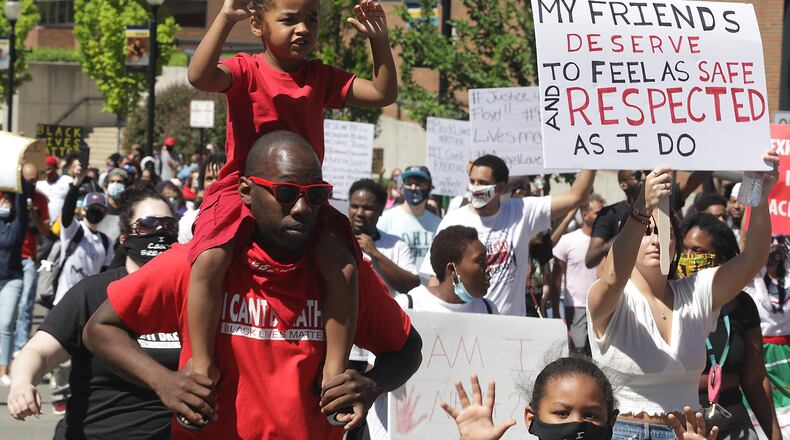“We are still fighting against some of the same systemic issues in our country today that (King) was fighting against when he was alive. I will say that things have improved. But we still have work that we need to do on behalf of the poor and the disenfranchised,” said Ernest C. Brown Sr., the senior pastor at St. John Missionary Baptist Church in Springfield.
Credit: Bill Lackey
Credit: Bill Lackey
The killing of an unarmed black man while in Minneapolis Police custody in May sparked a series of protests across the country this summer.
George Floyd’s death renewed conversations about police brutality and systemic racism in the country and prompted massive protests in the months that followed.
For some that spoke to the Springfield News-Sun, peaceful protest and discussions that followed were a continuation of work done by past civil rights leaders such as King.
The idea is to dismantle what they see as systems of oppression as well as promote equality and equity.
Multiple demonstrations took place in Clark County as organizers and participants protested against racial injustice. Those coincided with large protests and demonstrations that occurred across the country as well as in other parts of the world.
“One of the things that excited me about this summer was seeing young people of every ethnicity come together in such a powerful way. It was something that I have never seen before in my life,” Brown said, praising peaceful demonstrations that had occurred.
Hundreds of people marched through downtown Springfield at the end of May to protest Floyd’s death and police brutality as well as highlight injustices faced by Black communities across the nation.
Other demonstrations took place in Springfield and New Carlisle as well as in parts of Champaign County. Though there was violence at some protests held across the country , local marches remained peaceful for the most part.
Springfield city leaders praised the large demonstration at the end of May that saw hundreds of people in attendance, but also denounced and addressed property damage in downtown Springfield that was committed by a small group of people hours after that demonstration, according to police.
Eli Williams, with Urban Light Ministries, said it is important to build upon the foundation of nonviolent protest, saying that will have a more lasting impact in working toward a more just society.
“Unfortunately, there are always some who don’t hold to that and are looking to do acts of violence. But that is probably always going to be the case. But that shouldn’t be allowed to sully, as it were, the efforts of those whose intent were peaceful protest and not violence,” Williams said.
Williams added that cases of police brutality, the shooting of unarmed Black Americans and disparities that are disproportionality faced by black communities in the country highlight the importance of King’s message.
“We have a long way to go in this country and undoubtedly in many other places on earth. The unity that so many of us long for is not here yet, so it is one day at a time, one month at a time, one year at a time,” he added.
“It comes down to an issue of the heart. You really don’t know what is in peoples’ hearts until such a time as something happens that causes them to reveal what is in their heart.”
Both Williams and Brown joined other faith leaders in the community in a prayer march that took place in June to highlight racial injustices.
They are both part of a group called Simunye, a Zulu word meaning “We are one.” The group works to establish a dialogue amongst different congregations that represent different populations in the community. It was also created to start conversations around racial reconciliation.
For Williams, those efforts are in part a continuation of what he believes is King’s legacy.
“I believe (King) left a very strong legacy of trying to do the right thing in life by working for fairness, equality, for justice and for those that are most often denied it,” he said, noting that means promoting a community were all are truly treated as brothers and sisters.
The social justice protest over the summer have also lead to several open dialogues centered around racial injustices as well as what can be done to address what participants see as systemic and historic issues.
That included a town hall in September were a dozen elected officials and community leaders gathered to discuss issues that disproportionally impact minority communities in Clark County.
Credit: Bill Lackey
Credit: Bill Lackey
Those who participated included Springfield government officials, a Clark County commissioner, the sheriff as well as representatives of faith-based organizations and the president of the Springfield unit of the NAACP.
The organizer of the discussion, Springfield native Lauren Kelley, said at the time that it was important to hear from elected officials and other community leaders on where they stand. That in turn gives residents a better sense of what is being done or what other types of actions are needed to address those issues.
That could include ideas and training focused on fostering more respect between the community and local law enforcement. It could also mean looking at what factors are creating barriers in access to education or healthcare for residents.
Denise Williams, President of the Springfield NAACP, said she feels over the course of the last year “a lot” of progress has been made. She said she feels as though she can “sit at the table with my Springfield white brother and sisters and have a conversation about change.”
“I applaud our community for what they have been doing,” Denise Williams said. “But we still have a ways to go.”
Also in the wake of social justice protest that took place over the summer was the creation of community advisory teams designed to work with members of local law enforcement.
One will be working with the Clark County Sheriff’s Office, while the other will be working with the Springfield Police Division.
The goal is to have teams made up of community leaders and members that would be responsible for reviewing local policing policies as well as reviewing officer-involved incidents.
Another responsibility would to better bridge the gap between local law enforcement entities and the communities they serve.
Denise Williams said as she reflects on 2020, and watches the news of 2021, she said she feels at a loss.
“I’m happy with where we are now here in Springfield, but we are still on high alert,” Denise Williams said. “Look at the news, we aren’t done. We still have a long way to go. But I’ll say this, we are not where we were.”







